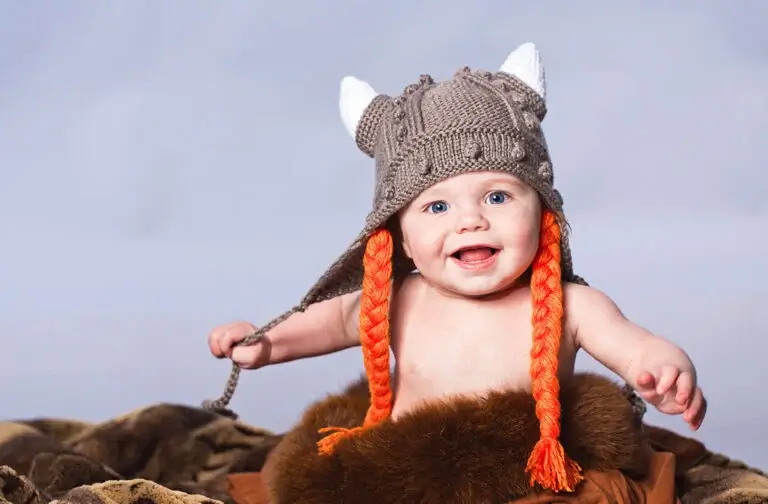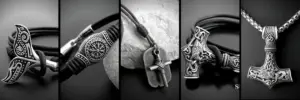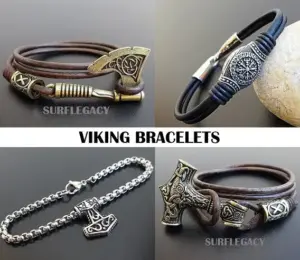Scandinavia is a geographical area located in Northern Europe, consisting of the kingdoms of Sweden, Norway, and Denmark. The inhabitants of these countries were formerly called Vikings.
These people began to be known in the rest of Europe around 793. The earliest references to their exploits and their political relations with northern Britain date back to 793.
The Vikings became famous for their raids and pillaging in Europe and, over the centuries, have been the inspiration for many works of art, novels, and films.
Their fame is due, in part, to the pride of their exploits, but they are also known for the original and evocative names by which they were christened.
What is the meaning behind Viking names?
Many boys in the Viking Age were named after the god Thor, such as Toke and Thorsten. Animal names were also popular. It was not uncommon to come across Vikings with names like Orm (Serpent), Ulf (Wolf), and Bjrn (Bear).
These names honor the gods’ formidable foes, such as the Midgard serpent and the wolf Fenrir, which the Norse gods had to defeat at Ragnarök. The names could also be endowed with special abilities.
For example, Frida means “peace,” and Astrid means “beautiful and loved,” implying that she was a highly sought-after woman. This contrasted with Hilda, which means “the fighter.” The names provided the Vikings with strength and protection throughout their lives.
Why choose a Viking name?
Choosing a Viking name for your newborn baby is very popular right now. If you want a name for your newborn that conveys strength, courage, and bravery, as well as being simply cool, a male Viking name may be for you.
But how do you know what name to choose and what it means? We looked up some cool male and female Viking names and their meanings.
So If you want to give your brave little explorer a Viking name, browse our list of names inspired by these Norse conquerors.
What are the most popular Viking names?
The most popular Viking names were actually quite simple and straightforward. The most common names for Viking men were: Ragnar, Erik, Thor, Gunnar, Ivar, Sigurd and Bjorn.
For Viking women, the most popular names were Freydis, Gudrun, and Astrid. These names were so common because they were easy to pronounce and remember.
They were also the names of some of the most famous Viking heroes and heroines.
Viking Name Generator
Your Viking name is:
Viking Names Male
- Aren: translates to “he who rules like an eagle.”
- Arie: This name is a Scandinavian variant of Ari and the Hebrew name Ariel; it means “lion,” “lion of God,” or “eagle.” Aria is the female counterpart.
- Armengol: derived from the name Ermin, a Scandinavian mythological demigod. Ermengol Variant
- Arne: In Old Norse, this name means “eagle.”
- Asger: derived from the elements Ass, which means “god,” and geirr, which means “spear.”
- Arvid: derived from the Old Norse elements arn “eagle” and vir “tree.”
- Ax: is short for Axel, a male boy’s name popular in Nordic countries. Its likely etymology can be found in the primitive language word Chiede, which means “axe, weapon of war.”
- Balder: This name means “the glorious” or “prince.” He was the son of Odin and Friga and the personification of good, light, and beauty, as well as the god of eloquence and wisdom.
- Bard: The Norwegian spelling of the Old Norse name Bárr, which is derived from the elements bau “battle” and frir “peace.”
- Birger is a keeper.
- Bjorn: pronounced “Biorn.” This was a popular Viking name that meant “pronounced man” and could also mean “bear.”
- Bo: the inhabitant
- Brynjar: Old Norse for “warrior in armor.”
- Dag: A Scandinavian name. The literal translation is “the light of day.” Mythology: the son of the night who rode his horse around the Earth bringing daylight
- Dan: “The Dane” in Old Norse • Dustin: Derived from an English surname that has its origins in Old Norse órsteinn or Torsten meaning “stone of Thor.”
- Daven: translates as “beloved man.”
- Didrik: A variant of the name Diederik that means “people’s leader.” Dietrich is a name derived from the German name Dietrich.
- Ebbe: Eberhard’s diminutive, derived from the Old Norse term “boar”
- Eero: Variant of Eric, Scandinavian name meaning “chief, ruler”
- Egil: Viking name meaning “impressive.”
- Einar: This name derives from Old Norse and means “lone warrior” or “warrior leader.” The heroes of Valhalla are mentioned in these countries’ ancient legends. Einer, Einarr are variants.
- Eindride: From the Norse Eindrii, which may be derived from the elements ein “one, alone” and ra “to mount.”
- Eirkr: derived from ei “meaning the one” and rik “forever the one prince or ruler.”
- Elvis: From the Norse name Alvis, which means “all wisdom.”
- Erik or Eric: translates as “eternal ruler, absolute ruler.” It is derived from the Norwegian name Eirkr, which combines the elements ei (“always, ever”) and rkr (“ruler”). Eirkrinn Rauda (Eric the Red), a 10th-century navigator and explorer who discovered Greenland, was a notable bearer of this name. Variants include Eirik, Erik, and Eric.
- Esben: Danish and Norwegian variant of Asbjörn, an Old Norse name combining Ass, meaning “god,” and björn, meaning “bear.”
- Frode: wise and astute
- Gerd: a popular male name in Scandinavia and Germany, derived from Gerda, the goddess of fertility in Scandinavian mythology. It also means “fortitude.”
- Gisli: Literally, “a ray of sunshine.”
- Gorm: a god-worshipper
- Haakon: Right-handed, useful.
- Hakon: means “Northern descendant” or “important family member.” Variants include Hak, Hakan, and Hako.
- Helge: German for “holy.” It is Helga’s masculine form.
- Halfdan: a Danish citizen.
- Halstein: From the Norwegian words Hallsteinn, which combine hallr (rock) and steinn (stone).
- Halvard: A Viking name that means “guardian of the rock.”
- Hans: Juan means “God was kind” in Spanish. Variants include Hansi, Han, Hannes, and Hansel.
- Harald: lord and ruler in Old Norse, or “generous host” in English.
- Harold: “armed leader.” Harold, Herald, Aralt, Arry, Hal, Harald, Haralds, Haroldo, and Harry are all variations.
- Heimdal or Heimdall: God who protected the gods from giant attacks and was endowed with exceptional sight and hearing. Unlike Loki, he represented the beginning of all things.
- Hemming: Possibly derived from the Old Norse hamr “shape” and was originally a nickname for someone thought to be a shape-shifter.
- Herleifr: a combination of the Old Norse words herr (army) and leifr (son, descendant).
- Hjalmar: derived from the Old Norse word hjálmarr, which means “warrior’s helmet.”
- Hodur is Norwegian for “horr.” “ruthless fighter.” He was a blind god, Balder’s brother, who died by accident after being duped by the god Loki.
- Holger: derived from the elements hólmr “island” and geirr “spear” in Old Norse. It’s also known as “chief of the island.” This was the name of a Danish nobleman who served as one of Charlemagne’s generals.
- Inge: He was a Viking god whose name most likely means “God.”
- Ivar: a Scandinavian name that means “bowed warriors” or “archer.”
- Jarle: A Scandinavian name used in Norway that means “leader.”
- Jensen: a Finnish, Danish, or Norwegian name that means “son of Johannes.” Jens is a variant.
- Jorgen: translates as “farmer.”
- Jostein: The name Jostein is primarily used in German and Scandinavian. Their language is based on Old Norse. Derived from ior, which means “horse, foal,” ehwaz, which means “horse,” and steinn.
- Kre: has curly hair
- Knut: From the Old Norse kntr, which means “knot.” Knut was a Danish prince who defeated King Elraed II of England and became ruler of Denmark, Norway, and England in the early 11th century.
- Lars: derived from Lorenzo, from the Latin word “laurus,” which means “laurels.”
- Leif: descendant, derived from the Old Norse Leifr, which means “descendant, heir.”
- Magni: From the Old Norse magn, which means “powerful, strong.” This name is given to a son of Thor and the giant Járnsaxa in Norse mythology.
- Markku: A Scandinavian name that means “rebel.”
- Ngozi: This Viking surname means “blessed.”
- Niels: means “people’s victor.”
- Njal: it menas Giant
- Njord: from Old Norse Njörr, which was most likely derived from an Indo-European root meaning “strong and vigorous.” Njord was the Norse god of the sea, fishing, commerce, and fertility. He was the patron deity of sailors. He was a Vanir member, along with his children Freyr and Freya. Niord is a variant.
- Odin: the supreme god of Norse mythology. “Fear, excitement, the mind, and inspiration.” His role, like many Norse gods, is complicated. He is the god of knowledge.
- Olav: From the Old Norse Aleifr, which means “descendant of the ancestor” or “ancestor’s inheritance” or “the one who receives the inheritance.” The elements anu “ancestor” and leifr “descendant” are combined to form the name. This was the name of five Norwegian kings, including Saint Olaf. Olaff, Olavo, Olan, Olao, Olof, and Olaf are variants.
- Oleg: It derives from the word heil, which means “health.” It’s the masculine form of Helga, which is a Scandinavian variant of Olga.
- Oliver: It is a name derived from the Norwegian name Olaf, which is thought to have been changed to correspond with the Latin word “olive tree.”Olson: means “son of Olaf.”
- Orvar: An Old Norse word that means “arrow.”
- Porarinn: It means “Thor’s eagle” in Old Norse.
- Porgist: derived from the Old Norse words for “Thor” and “arrow.”
- Porir: Means “Thor’s warrior.”
- Ragnvall: derived from the Old Norse elements region “council, council” and valor “power, ruler.” Ronald is a variant.
- Ralph is derived from the Old Norse name Radulf. It translates as “wolf counselor.”
- Randall is derived from the Old Norse name Randel. Contains the Germanic element run, which means “of the shield.”
- Rurik: He was a well-known Norwegian ruler. His surname is widely used in Scandinavia and Russia
- Sigbjörn: A Scandinavian surname. It is a combination of the words sigr, which means victory, and björn, which means bear. It is the Icelandic and Swedish version of the name Sigbjrn, which is also used in Denmark and Norway.
- Sigmund: derived from the Old Norse words sigr (victory) and mundr (protector). In Norse mythology, this was the name of the hero Sigurd’s father, who possessed the mighty sword Gram.
- Sigurd: From the Old Norse Sigurr, which was derived from the elements sigr (victory) and varr (guardian).
- Sindri: Old Norse for “small, trivial,” or “glittering.”
- Sixten: derived from the Old Norse name Sigsteinn, which is composed of the elements sigr (victory) and steinn (stone).
- Sveinn: “young man” or “boy” Svante, Swen, Swend, Sven, Svend are all variations.
- Thor: In Norse mythology, Thor is the god of thunder, and his name means “storm.”
- Tyr: is a boy’s name of Scandinavian origin. Tyr is an early manifestation of a Norse god, traditionally thought to guide the law, justice, war, and victory.
- Thorlak: the Scandinavian boy’s name means “bishop of Skalholt.”
- Thorstein: In Old Norse, it means “the stone of the mighty Thor.” Torstein is a variant.
- Trygve: a name derived from the Old Norse word for “trustworthy.”
- Ulf: an old Norse name that means “wolf.”
- Ullr: Ullr is primarily a male Scandinavian – Norse Mythology name that means Splendor, Glory. Ullr is the god of archery in Norse mythology.
- Valdemar: the name of a Danish king that means “the famous one who rules.”
- Vali: the god of archers, his aim is unrivaled. Odin’s son with the giantess Rind. He exacted revenge on Hör by burning him at the stake for killing Baldr.
- Vidar: derived from Old Norse Varr, possibly from vr “broad” and arr “warrior.” Varr was Odin’s son in Norse mythology. He will avenge his father’s death at the end of the world, Ragnarok.
- Viggo: A Scandinavian name that means “battle” or “war.”
- Yngve: The name is derived from the Old Norse word Yngvarr, which means “warrior.”
- Yves is an archer. Erwan is a Breton variant.
- Zíu: Primordial Norse and Germanic deity, later confused with Odin or Wotan. He was the god of the sky, light, and battle.
Female Viking Names
Here are some of the most popular Female Viking Names from the time period.
Many are derived from Norse goddess names, and some have even resurfaced as popular baby girl names in Scandinavia in recent years.
- Åse The name se is derived from the Old Norse word for “god-like” or “goddess.”
- Astrid was a popular Viking name that is still widely used today. It’s a popular name among Scandinavian royalty, including Princess Astrid of Sweden, who later became Queen of Belgium, and Princess Astrid of Norway.The name means “divinely beautiful,” though some sources claim it is derived from the Old Norse word for “godly strength.” Other famous Astrids include Norwegian singer Astrid S and Astrid Lindgren, the Swedish author of the well-known Pippi Longstocking books.
- Bodil Why not name your daughter Bodil if you want her to be a strong leader? It’s a lovely Norse name that means “commander,” “battle,” or “fighting lady.”
- Brenda: Perhaps a feminine form of the old Norse name Brandr, meaning “sword” and representing strength and momentum.
- Dahlia: means “valley”
- Engla: meaning “angel.”
- Elin: meaning “resplendent”
- Erika: meaning “the only princess”
- Eyra: Scandinavian goddess of health, meaning “the euphoric one”
- Freya was one of the most important Norse goddesses and Odr’s wife in Norse mythology. It is derived from the name Freyja and means “noble woman.” Some sources claim that Odr was Odin and Freya was his wife Frigg – a less appealing girls’ name for English speakers! Freya was the goddess of fertility, beauty, love, and war, and her name means “lady.” Freyia is a form of the Old Norse name Freyja.
- Frida, means “peace.” Frida Kahlo, a Mexican artist, and Swedish singer Frida Lyngstad from Abba are two famous Fridas
- Gerda: derived from Old Norse garðr meaning “enclosure.” In Norse myth Gerd was the goddess of fertility. The male form of Gerd, it means “strength.”
- Gertrud (or Gertrude) is an Old Norse name that means “spear” or “strength” and is popular throughout the Nordic countries. Gertrud was a goddess who transformed into a bird in Norse mythology, and Shakespeare named Hamlet’s mother Gertrude. Gertrude was also the name of two saints: Gertrude the Great, who was known for her kindness and gentleness and was the patron saint of travelers and gardeners, and Saint Gertude, who was the patron saint of cats.
- Gudrun is a popular Scandinavian name derived from the Old Norse words gu, which means “god,” and rn, which means “rune” or “secret lore.” Gudrun was a fiery heroine in Norse mythology whose life was anything but peaceful! She was originally the wife of the war hero Sigurd, but after Sigurd’s death, she married Atil, also known as Atila the Hun. She then murdered Atil in retaliation for killing her brothers. You don’t want to annoy a Gudrun!
- Gunhild (or Gunnhild) is derived from the Old Norse name Gunnhildr, which means “fight” or “battle.” It’s a spelling variation of the name Hilda (see below). Gunnhild’s popularity may be attributed to her role as one of the TV series The Vikings’ shield maidens, or Valkyries.
- Helga is derived from the Old Norse word heilagr, which means “holy,” “blessed,” “sacred,” or “divine woman.” Hel (a diminutive of Helga) presided over the underworld in Norse mythology, and Helga is Floki’s wife in The Vikings.
- Helmi: girl’s name of Finnish origin meaning pearl. Variant: Helmy.
- Hilda, which means “the fighter,” “battle woman,” or “ready for battle,” is not a name for a wimp. Coming from the Old Norse word hildr, which means “battle,” it’s a name given to girls by the Vikings to give them strength and protection in life. It’s also the name of a saint, Hilda of Whitby, who was the seventh-century founder and abbesses of Whitby Abbey.
- Ingrid this name is derived from the Old Norse name Ingiríðr, which means “beautiful goddess.” In Norse mythology, Ing was another name for Freya, the fertility and beauty goddess.the most famous Ingrid, Swedish film star Ingrid Bergman, was widely regarded as one of the world’s most beautiful women.
-
Idun its name meaning is “ever young”.Idun is a modern transcription of Iðunn, the name of the goddess of apples — possibly representing fertility — and youth in Norse mythology.
- Lena: Scandinavian and Germanic shortened form of Elena “radiant, bright, fire.”
- Liv is derived from the Old Norse word hlf, which means “shelter” or “protection.” It has also come to mean “life” in modern Nordic countries. Liv Ullmann, a Norwegian actress and film director, is the most well-known contemporary Liv.Randi
- Maja this name means “pearl.”
- Noora this name translates to “light.”
- Odell this term refers to someone who is in distress.
- Otta this term refers to a philosopher or creative person.
- Oglesby this means that it is not widely known or distributed.
- Randi origins and meaning can be attributed to a number of different factors. Some say it comes from the Old Norse name Ragnfrr, which means “loved by god,” while others say it’s a combination of the Norse words regin, which means “advice or counsel,” and frr, which means “beautiful.”
- Revna this name means raven
- Runa this name means “secret knowledge.”
- Saga this name means “seeing one,” implying a mystical ability to predict the future. It is derived from the Old Norse word sja, which means “to see.” Saga is the goddess of prophecy and wisdom in Norse mythology, and the best-known contemporary Saga is Saga Norén, the detective from the Scandi-crime drama The Bridge.
- Sigrid is another Viking name with several different meanings. Some sources say it means “victory” or “victorious horsewoman,” while others say it means “wisdom and beauty.” Its recent popularity as a name could be attributed to the Norwegian singer/songwriter Sigrid.
- Sif is derived from the Old Norse word sif, which means “wife or bride.” Sif was the wife of Thor and the golden-haired goddess of the earth and fertility in Norse mythology.
- Ulfhild this lovely Nordic name is derived from the Viking words ulf, which means “wolf,” and hildr, which means “battle” or “struggle.”
- Tove is derived from the Old Norse name Tófa, which means “beautiful Thor.” Other sources, however, claim it means “dove.” Tove Jansson, the creator of the Moomintrolls, and Swedish singer Tove Lo are two inspiring females named Tove.
- Thyra the meaning of the name Thyra is unknown. Some sources claim it means “thunder warrior” from the Old Norse words órr, which means “thunder,” and vg, which means “fight or battle,” while others claim it means “devoted to Thor” or “helpful.” In any case, Thyra was a Danish queen from the eighth century.
- Ursa is a diminutive of the popular female name Ursula and means “female bear” or “wild.”
What are some tips for choosing a Viking name?
When it comes to choosing a Viking name, there are a few things you should keep in mind. First and foremost, you want to make sure that the name you choose is a good fit for you and your personality.
After all, this is the name you will be known by for the rest of your life. There are a few different ways you can go about finding the perfect Viking name for you. One option is to look to your family history for inspiration.
Interesting facts about Viking names
- The vast majority of Viking names were compounds, made up of two (sometimes three) smaller elements.
- The first element was the base of the name, to which various suffixes and prefixes could be added.
- The second element was often a byname, describing some aspect of the person or their family.
- The third element was occasionally used, particularly in the case of female names.
- Viking names were usually descriptive, and often had to do with things like appearance, strength, or skill.
- Some names were quite literal, like “Kari” (curly-haired), while others were more metaphorical, like “Skeggi” (beard-face).
- Many names were also nicknames, given to people based on their personality or behavior.
- Viking names often had different forms, depending on whether they were used by a man or a woman.
Some interesting statistics about Viking names
- The most common Viking name was Ragnar.
- Viking names were often descriptive, such as Hrolf the Walker or Gunnhild Mother of Battle.
- Viking names could also be passed down from generation to generation.
- Viking naming conventions were similar to those used in other Germanic cultures of the time.
- Viking names are found in many different languages, including Old Norse, Icelandic, and Anglo-Saxon.
- Viking names are still used today, especially in Scandinavia.
- There are an estimated 7,000 Viking names still in use today.
- The meaning of some Viking names is unknown, due to the limited surviving records.
Buy Viking Jewelry
Finding the ideal Viking Jewelry can be challenging, especially if you lack inspiration or don’t know where to look. Surflegacy has you covered. We have a wide range of Viking items in various styles, shapes, colors, and materials, to accentuate your fashion look.
Our pieces are crafted in Italy with care and style in mind, and reasonably priced, so you won’t have to break the bank to get one. Visit our store and let us assist you on your fashion journey.




